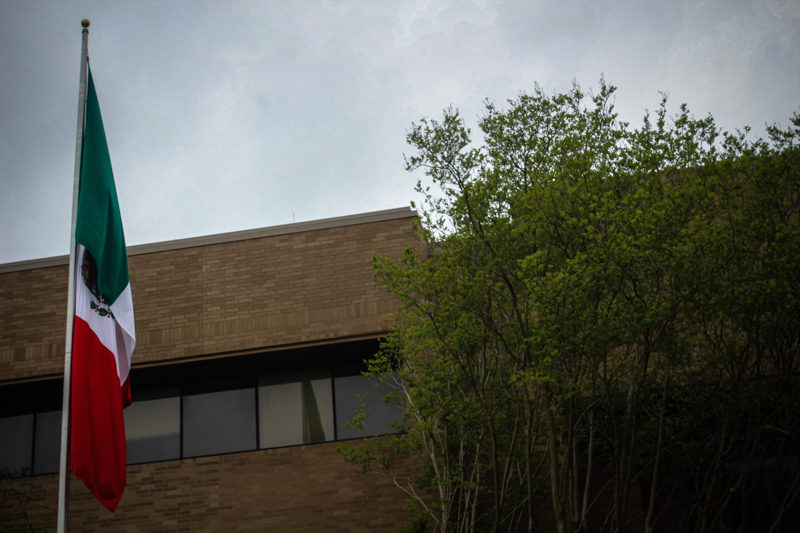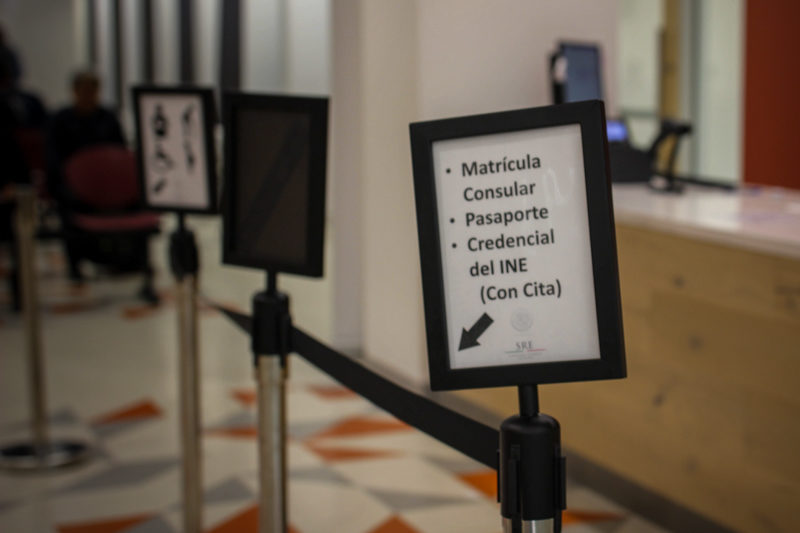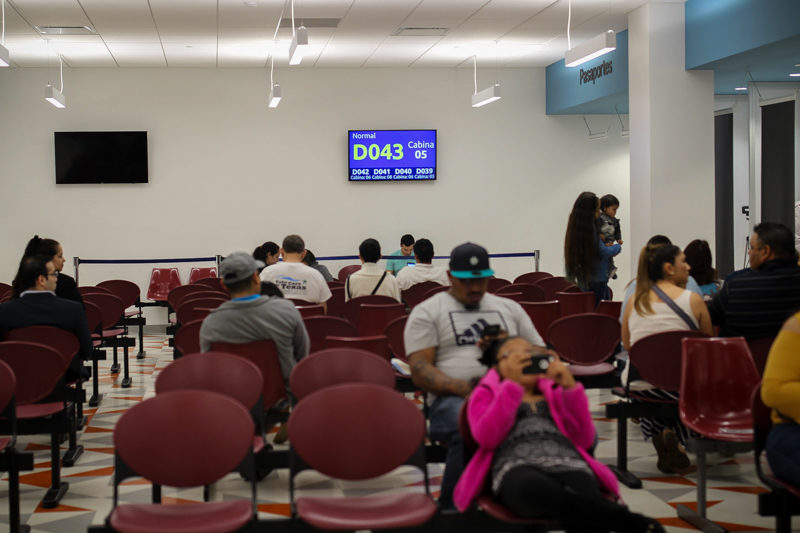Expat Voters Could Tilt the Results of Mexico’s July 1 Election
By Vicky Camarillo
Photography By Dayana Lopez
Reporting Texas

Consul General Of Mexico moved to its new location in 2017 because of the growing Mexican population in Austin. Dayana Lopez/Reporting Texas
Juan Pablo Servín wants to see change in his motherland. And thanks to a reform that opened voter registration to expatriates without their having to travel to Mexico, Servín is one of several thousand Mexicans in the Austin area to apply for a credential to vote in the upcoming elections.
On July 1, Mexican citizens will vote for the next president, members of Congress and state governors. Servín, a permanent U.S. resident who moved from Mexico in 2008, knows each presidential candidate is flawed, but he’s ready to cast his vote for Andrés Manuel López Obrador. The front-runner, if victorious, would become the country’s first leftist president since 1934.
“No matter what, for how long I’m out or if I’m not living there, it’s still my home land,” Servín said. “All my family is there, my friends are there, so we always are gonna be connected to Mexico, one way or another. … People need to vote and need to be engaged with Mexico, even if we’re not in Mexico.”
Mexico’s National Electoral Institute, or INE, has granted voting credentials to 500,000 Mexicans living abroad, a major jump from 59,000 in 2012. Fifty million people cast their votes in the 2012 election; Enrique Peña Nieto won with 38 percent of the vote and López Obrador was the runner-up with 31 percent. Analysts expect that voters abroad — most of whom live in the United States — will push the 2018 election in López Obrador’s favor.
The Dallas Morning News reported in mid-March that the city’s Mexican consulate was experiencing such a deluge of potential voters that many immigrants were being scheduled for appointments after the March 31 deadline to vote in the elections. Before the deadline, more than 67,000 people had registered to vote in Dallas.
Austin’s consulate did not see as much traffic: It processed 6,641 voter IDs, according to consulate press officer Miguel Soto.
U.S. Census Bureau 2016 estimates show that there are almost 260,000 people of Mexican descent in Austin, and about 70,000 of those are Mexican-born. Carlos González-Gutiérrez, Austin’s consul general, said the number of credentials is “not much, but they are a fair number for us.”
Voter registration is a two-part process: After expatriates apply for their credential and receive it in the mail, they must activate it by phone or online.

Mexicans citizens are able to register to vote for Mexico’s elections upon appointment. The consulate also provides passports and consular identification cards upon request. Dayana Lopez/Reporting Texas
INE announced on April 16, two weeks before the deadline to activate the voter IDs, that only 150,000 expatriates had activated their credentials, possibly because many potential voters didn’t know they had to activate the credential to be able to vote in July.
Electoral law reform allowed expatriates to vote from abroad for the first time in the 2006 elections, but it took several more years before INE (formerly the Federal Electoral Institute, or IFE) began credentialing abroad.
Mexico’s foreign vote project was intended to promote a “sense of belonging” in the Mexican diaspora, González-Gutierrez said. Almost 12 million Mexican-born people live in the United States, and a case study of Mexico’ s electoral process by International IDEA, an intergovernmental organization that works to bolster democracies, called that migrant movement one of the world’s “largest, most persistent and most focused.”
“The whole principle behind this … is that you could be a loyal and productive citizen of this country and at the same time remain engaged with your country of origin, that it was not a matter of choosing one or the other,” González-Gutiérrez said.
The fight for the right to vote abroad was born from the mobilization of several groups of Mexicans living in the United States, gradually joined by political forces, social movements and opinion leaders in Mexico, the case study said. It was not an easy win; Congress members butted heads, first of all, on extending voting rights to citizens not residing in the country.
“Some parties and some sectors within the parties felt that people voting from abroad could decide the outcome of the election, and they were not comfortable with that,” González-Gutiérrez said. “I think that many of them feared the disruptive power of migrants. And to some extent, they are correct — migrants are an agent of change.”
Miguel Soto, press officer for the Austin consulate, said it’s unclear how many undocumented people have applied for a voter ID because officials do not ask visitors about their immigration status. But the electoral reform would particularly benefit undocumented people who didn’t want to risk deportation by traveling to Mexico for their voter registration, González-Gutiérrez said.

Consulate visitors waiting in lines at the consulate on the last day to register for voting. Dayana Lopez/Reporting Texas
One recent morning, an undocumented man named Roberto waited for his name to be called at the Mexican consulate in Austin. It was a slow morning; he was the only voter ID applicant in an almost two-hour stretch. He’s been living in the United States for about 20 years, but he speaks little English and makes constant trips back to his native Chihuahua. “Even though we’re in this country, we still go back to Mexico,” Roberto said, “so when we go back, we want a better government and better security.”
Asked if he’d hesitated to visit the consulate in light of his undocumented status, Roberto smiled and said simply, “Of course not, because fear isn’t good.”
With such a substantial growth in the number of credentialed voters, pundits on both sides of the border anticipate that external voters will be crucial in deciding the presidential election — especially because 80 percent of the 500,000 potential voters are in the United States, where growing anti-immigrant sentiment has positioned López Obrador as an antidote to Trump.
For a country that has historically made external voting difficult, stronger enfranchisement of Mexicans abroad is a good thing, said Tony Garza, former U.S. ambassador to Mexico.
In these elections, “the participation will be likely larger than ever before,” Garza said. “One, you have a lot more registered voters, and they made the effort — that suggests some desire to participate, some motivation. But secondly, I think there’s a fair amount of interest in the national elections year this cycle, both abroad and within the country.”
Although interest is high, González-Gutiérrez wasn’t so sure that Mexicans abroad will tip the scales.
“In contrast to what many people think, experience has shown us that Mexicans abroad are divided, just like in Mexico,” he said. “Those divisions, in terms of partisanship in Mexico, are replicated abroad.”
Servín, whose friends in Mexico are very politically divided, is well aware of that. He is upfront about his support for the left-wing MORENA party: “López Obrador maybe is radical, but maybe that’s what Mexico needs — a radical change.” Yet Servín said one party’s victory isn’t the most important thing.
“I think that the most important thing is that everybody contributes and everybody knows what’s going on and everybody do their duty as a citizen” and choose their next leader, Servín said. “So whoever wins is going to be whoever is the best — or, at least, that’s what we’re looking for.”